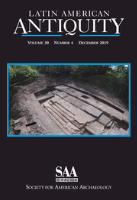
LATIN AMERICAN ANTIQUITY
Scope & Guideline
Fostering Dialogue on Latin America's Historical Narrative
Introduction
Aims and Scopes
- Archaeological Methodologies:
The journal emphasizes the application of various archaeological methods, including excavation, material analysis, and remote sensing, to investigate ancient societies in Latin America. - Cultural and Social Dynamics:
A core focus is on exploring the social structures, cultural practices, and daily lives of ancient populations, including their interactions with the environment and each other. - Interdisciplinary Approaches:
LATIN AMERICAN ANTIQUITY encourages interdisciplinary research, integrating insights from anthropology, history, and environmental science to provide a holistic understanding of ancient cultures. - Chronological and Spatial Analyses:
The journal publishes studies that contribute to the chronological and spatial understanding of human occupation and cultural development across diverse regions in Latin America. - Material Culture Studies:
Research on artifacts, including ceramics, lithics, and textiles, is a significant component, with an emphasis on understanding their production, use, and social significance.
Trending and Emerging
- Bioarchaeology and Health Studies:
There is a growing trend towards bioarchaeological research, focusing on health, diet, and social inequality, which enhances understanding of the lived experiences of ancient populations. - Technological Innovations in Archaeology:
The incorporation of advanced technologies such as isotopic analysis, 3D modeling, and geospatial analysis is on the rise, providing new insights into ancient practices and environments. - Interregional Interactions and Networks:
Emerging studies are increasingly examining interregional interactions, trade networks, and cultural exchanges, highlighting the complexity of ancient societies beyond isolated narratives. - Environmental Archaeology:
Research focusing on human-environment interactions and the impact of climate change on ancient societies is gaining importance, addressing contemporary issues through historical lenses. - Decolonization and Indigenous Perspectives:
There is a notable increase in research that incorporates indigenous perspectives and methodologies, reflecting a broader movement towards decolonization in the field of archaeology.
Declining or Waning
- Traditional Historical Narratives:
There is a noticeable decline in papers focusing solely on traditional historical narratives of conquest and colonialism, suggesting a shift towards more nuanced and diversified perspectives. - Single-Culture Studies:
Research that examines isolated cultures without considering broader regional interactions seems to be decreasing, indicating a trend towards integrative studies that emphasize interconnectedness. - Conventional Artifact Typologies:
There is a waning interest in strictly typological studies of artifacts, with a shift towards analyses that incorporate functional and contextual interpretations of material culture. - Eurocentric Perspectives:
Papers that primarily reflect Eurocentric views of Latin American archaeology are becoming less common, as the field moves towards decolonization and inclusivity of indigenous voices and perspectives. - Simplistic Environmental Models:
The journal has seen fewer studies relying on simplistic models of environmental adaptation, favoring more complex analyses that consider multiple variables and long-term ecological changes.
Similar Journals
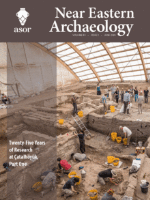
NEAR EASTERN ARCHAEOLOGY
Pioneering Insights into Archaeology and HistoryNEAR EASTERN ARCHAEOLOGY, published by University of Chicago Press, is a premier journal dedicated to the field of archaeology, particularly focusing on the rich cultural heritage and archaeological findings of the Near East. With an ISSN of 1094-2076 and an E-ISSN of 2325-5404, this esteemed publication provides a vital platform for scholars and practitioners to share their research, insights, and discoveries. The journal holds an impressive ranking in the Q1 quartile for both Archaeology and History in 2023, reflecting its significant impact within these fields and a robust history of scholarly contribution. The journal has been pivotal in shaping discussions around archaeological methodology, theory, and contemporary issues from 2002 to 2024, as it continues to reach a wide audience through various access options. With Scopus rankings placing it in the top percentiles for both History and Archaeology, NEAR EASTERN ARCHAEOLOGY represents an essential resource for researchers, professionals, and students alike, fostering the exploration and understanding of the region's archaeological narrative.

ARCHAEOLOGY
A Scholarly Journey Through Time and CultureARCHAEOLOGY is a distinguished peer-reviewed journal published by the Archaeological Institute of America, focusing on the multifaceted aspects of archaeological research and its relevance to contemporary society. Established in 1966, this journal serves as a critical platform for scholarly discourse in the field, showcasing innovative findings, theoretical advancements, and methodological discussions related to archaeology. While it maintains a Q4 ranking within the disciplines of archaeology and arts and humanities, its contributions remain valuable for those engaging in archaeological studies or seeking to understand historical and cultural narratives. The journal is accessible in print, with an ISSN of 0003-8113 and an E-ISSN of 1943-5746, ensuring that a wide audience can benefit from its insights. Although currently not classified as Open Access, the meticulous peer-review process ensures a high standard of academic rigor, making it an essential source for researchers, professionals, and students alike who are dedicated to exploring the past through archaeological lenses.

OLBA
Unearthing Insights into Ancient CivilizationsOLBA is a distinguished journal in the field of archaeology, published by Mersin University Publications Research Center Cilician Archaeology in Turkey. With an ISSN of 1301-7667, this academic journal has been a platform for scholarly discourse from 2009 to 2014 and again from 2016 to 2019, with a recent volume published in 2022. Although it is currently categorized in the fourth quartile (Q4) for both Arts and Humanities and Social Sciences within archaeology, OLBA continues to contribute significantly to the global archaeology community. It serves as an essential resource for researchers, professionals, and students interested in the diverse aspects of archaeological studies and cultural heritage. Despite not being an open-access journal, OLBA strives to disseminate knowledge effectively, aiding in the exploration of ancient civilizations and the rich tapestry of human history. Its Scopus rankings, placing it in the bottom percentiles, demonstrate the ongoing need for the community to support and engage with the journal to enhance its visibility and impact in the archaeological domain.

Intersecciones en Antropologia
Unlocking the richness of human experience.Intersecciones en Antropologia, published by the Universidad Nacional del Centro de la Provincia de Buenos Aires (UNICEN), Facultad de Ciencias Sociales, is a premier open-access journal in the field of anthropology, having established its presence since 2010. With an impressive impact factor and currently holding the distinguished Q1 quartile ranking in anthropology for 2023, this journal has quickly become a vital resource for scholars and practitioners alike, offering a platform for innovative research and critical discussion. The journal aims to advance anthropological scholarship by encouraging the dissemination of diverse perspectives and stimulating dialogue across geographical and cultural boundaries. Its open-access model, adopted in 2017, ensures that valuable research findings are accessible to a global audience, fostering collaboration and engagement within the academic community and beyond. Located in the vibrant cultural context of Argentina, Intersecciones en Antropologia serves as a conduit for significant anthropological dialogues, making it an essential read for those dedicated to understanding and contributing to the evolving landscape of social sciences.
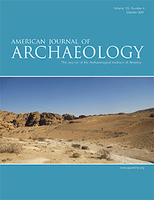
AMERICAN JOURNAL OF ARCHAEOLOGY
Decoding the Past for Tomorrow's ScholarsThe American Journal of Archaeology (ISSN: 0002-9114, E-ISSN: 1939-828X), published by the esteemed University of Chicago Press, stands as a leading scholarly journal in the field of archaeology, celebrated for its rigorous peer-reviewed research. With an impressive impact factor that places it in the Q1 quartile for both archaeology and archaeology within the arts and humanities, this journal ranks among the top 15% in its field, according to Scopus metrics. It serves a global audience of researchers, professionals, and students, facilitating the dissemination of innovative findings from excavations, historical analyses, and methodological advancements. While primarily available through subscription, the journal's archives and features provide invaluable resources for deepening one's understanding of the past and engaging with current archaeological discourse. Operating from its home in Chicago, USA, the American Journal of Archaeology actively contributes to the advancement of knowledge and scholarship in archaeology, making it an essential platform for those invested in the exploration of ancient civilizations and cultural heritage.
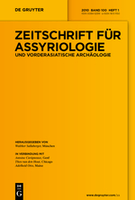
Zeitschrift fur Assyriologie und Vorderasiatische Archaologie
Connecting Scholars Through the Lens of Ancient HistoryZeitschrift für Assyriologie und Vorderasiatische Archäologie, published by WALTER DE GRUYTER GMBH, is a distinguished journal in the field of archaeology, focusing on the rich histories of the ancient Near East and Assyrian studies. Established in 1886, this journal has a venerable tradition of contributing to scholarly discourse, continuously curating impactful research that positions it within the Q2 quartile in the domains of Archaeology and Arts and Humanities as of 2023. With an impressive ranking of #101 out of 413 in Arts and Humanities and #98 out of 354 in Social Sciences within Scopus, the journal serves as a vital resource for researchers, professionals, and students alike. Although it operates under a subscription model, the journal's extensive coverage—from its inception to the present day—ensures a comprehensive exploration of archaeological methodologies, discoveries, and theoretical frameworks. The journal's aim is to advance the understanding of the ancient civilizations of the Near East and to foster scholarly communication across international platforms, making it an essential venue for contemporary archaeological research.

Spal
Charting the Course of Archaeological Discovery.Spal is a distinguished academic journal dedicated to the fields of Archaeology and History, published by the University of Seville, Editorial. With an ISSN of 1133-4525 and an E-ISSN of 2255-3924, it has established a prominent reputation within the scholarly community, currently enjoying an impressive Q1 ranking in Archeology (Arts and Humanities) and History, alongside a Q2 ranking in Archeology for 2023. The journal serves as a critical platform for researchers, professionals, and students alike, promoting the dissemination of cutting-edge research and innovative methodologies in these vital disciplines. Spal's Scopus Ranks place it in the 84th percentile for Arts and Humanities - History and the 72nd for Archeology within the field, emphasizing its impact and relevance in contemporary scholarship. Although it operates under a traditional access model, its commitment to advancing knowledge and discourse in archaeological and historical studies remains unwavering. The journal's coverage spans from 2015 to 2024, positioning it well to contribute to ongoing academic conversations and foster collaborations within the global research community.
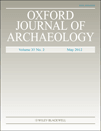
Oxford Journal of Archaeology
Elevating Archaeological Scholarship to New HeightsOxford Journal of Archaeology is a prestigious peer-reviewed journal published by WILEY, dedicated to advancing the field of archaeology through innovative research and insightful discourse. Established in 1982, this journal has become a vital resource, showcasing high-impact studies that resonate within the arts and humanities, as well as interdisciplinary fields such as geography and planning. With an impressive Q1 ranking in both Archaeology and Arts & Humanities categories, and a Q2 ranking in Geography, Planning, and Development, the journal consistently maintains its reputation for excellence—evidenced by its ranking in the 81st percentile within the Scopus Arts and Humanities Archaeology category. The Oxford Journal of Archaeology not only provides scholars, professionals, and students with access to cutting-edge archaeological research but also encourages collaboration and dialogue among a diverse academic community. Although the journal does not currently offer Open Access, it remains a crucial platform for those seeking to expand their knowledge and impact in this dynamic field.
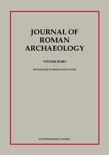
Journal of Roman Archaeology
Fostering Dialogue on the Rich Tapestry of Roman HistoryJournal of Roman Archaeology is a premier academic journal published by CAMBRIDGE UNIVERSITY PRESS, dedicated to advancing knowledge in the fields of archaeology, classics, and visual arts. With its established reputation since 2005, the journal occupies a significant place in the scholarly community, featured in the Q1 quartile in both Classics and Visual Arts & Performing Arts categories, as well as Q2 and Q3 in Archaeology, reflecting its high impact and relevance. The journal not only presents rigorous research but also fosters interdisciplinary dialogue among researchers, professionals, and students across related fields. Although it does not operate under an open access model, it provides essential insights and critical analyses that contribute to understanding Roman archaeological practices and artifacts. With an ISSN of 1047-7594 and an E-ISSN of 2331-5709, the Journal of Roman Archaeology is an indispensable resource for anyone engaged in the exploration of ancient cultures, heritage preservation, and archaeological methodologies.

Ancient Civilizations from Scythia to Siberia
Fostering Discourse on the Foundations of CivilizationAncient Civilizations from Scythia to Siberia, published by BRILL, is a pivotal journal dedicated to the exploration and scholarly analysis of ancient cultures in Eurasia, with a focus spanning from the Scythian tribes to the Siberian territories. With an ISSN of 0929-077X and an E-ISSN of 1570-0577, this journal plays a significant role in the fields of Archeology, Classics, and History, holding esteemed rankings in Q3 and Q1 categories, thus affirming its status in the academic community. Covering a wide temporal range from 1995 to 2024, the journal aims to provide a comprehensive platform for researchers and students to disseminate their findings and foster collaborative discourse. With impact rankings in the 86th and 75th percentiles for Classics and History, respectively, it is recognized for its high-quality contributions that advance knowledge in these areas. Although currently not an open-access journal, it offers various options for accessing its rich content. By bridging gaps in historical understanding and engaging with the complexities of ancient societies, Ancient Civilizations from Scythia to Siberia remains an essential resource for those passionate about uncovering the narratives of our past.